-
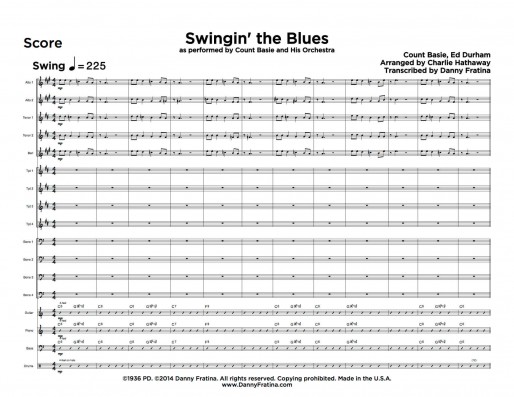 This early Count Basie barn burner absolutely crushes on the blues, with catchy section work, a killer shout chorus, and solo space for both tenors and two trumpets. Starting small up front in the key of C, this arrangement builds up with great riffs, a Durham/Lunceford style chromatic modulation, and a massive shout chorus in two parts.
This early Count Basie barn burner absolutely crushes on the blues, with catchy section work, a killer shout chorus, and solo space for both tenors and two trumpets. Starting small up front in the key of C, this arrangement builds up with great riffs, a Durham/Lunceford style chromatic modulation, and a massive shout chorus in two parts.Instrumentation Big Band Style Swing Era Level 3 TEMPO  = 225
= 225Trumpet
Range
-
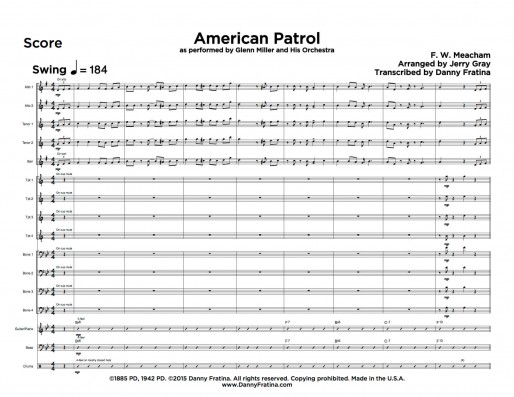 American Patrol hit #15 on the Billboard charts in 1942 and was one of Glenn Miller's last hits before joining the military and powered by a creative Jerry Gray arrangement it still holds up today. Mostly full of tight ensemble playing and only a single 16-bar solo, American Patrol is a staple of every big band book.
American Patrol hit #15 on the Billboard charts in 1942 and was one of Glenn Miller's last hits before joining the military and powered by a creative Jerry Gray arrangement it still holds up today. Mostly full of tight ensemble playing and only a single 16-bar solo, American Patrol is a staple of every big band book.Instrumentation Big Band Style Swing Era Level 3 TEMPO  = 184
= 184Trumpet
Range
-
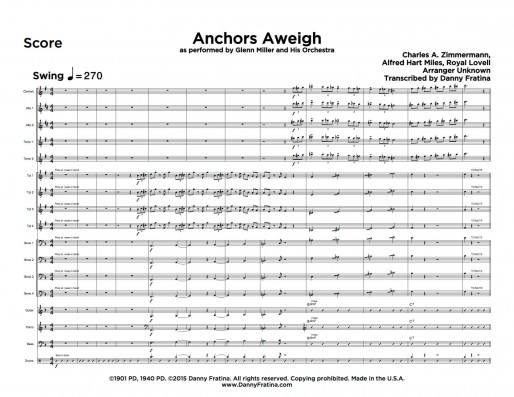 Anchors Aweigh is a classic Glenn Miller flag waver and it is a beast of chart. Lightning fast mute changes, rapid fire horn lines, swinging fanfare sections, and a rager of a back half make this is a difficult but exciting chart despite the unassuming source material it's based off of.
Anchors Aweigh is a classic Glenn Miller flag waver and it is a beast of chart. Lightning fast mute changes, rapid fire horn lines, swinging fanfare sections, and a rager of a back half make this is a difficult but exciting chart despite the unassuming source material it's based off of.Instrumentation Big Band Style Swing Era Level 4 TEMPO  = 270
= 270Trumpet
Range
-
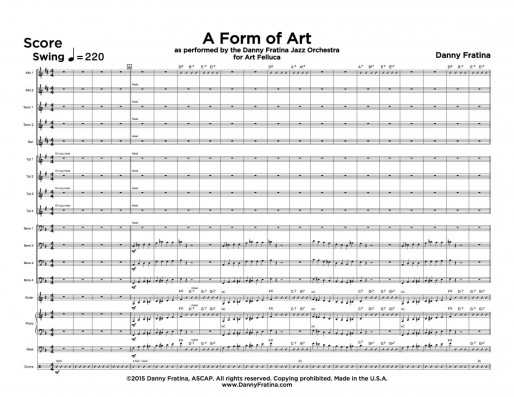 A Form of Art is a wild alto sax feature filled with the vocabulary of Duke Ellington and Paul Gonsalves. This is a frenetic, crescendoing rhythm changes tune featuring the alto soloing throughout. It's purely an improvisation vehicle; there is no melody for the alto to play. You must have an alto saxophone player in your band who is comfortable keeping the energy up across one long extended solo.
A Form of Art is a wild alto sax feature filled with the vocabulary of Duke Ellington and Paul Gonsalves. This is a frenetic, crescendoing rhythm changes tune featuring the alto soloing throughout. It's purely an improvisation vehicle; there is no melody for the alto to play. You must have an alto saxophone player in your band who is comfortable keeping the energy up across one long extended solo.Instrumentation Big Band Style Swing Era Level 4 TEMPO  = 220
= 220Trumpet
Range
-
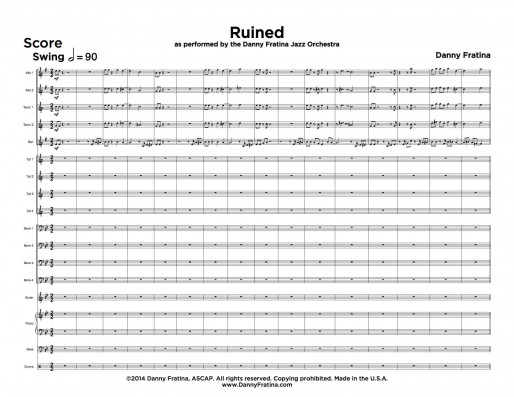 Ruined is a funky chamber jazz tune with feature space for guitar and trumpet. It starts with saxes only with no rhythm section, adding in trombones, then trumpets, before building into a guitar solo. The trumpet solo gets some space over trombone chorale before the rhythm section jumps back in, and it ends with a dismantling of each section until nothing is left but the five saxes. Each horn player keeping good time is critical for this composition, but the reward is a lush and exciting groove-based piece.
Ruined is a funky chamber jazz tune with feature space for guitar and trumpet. It starts with saxes only with no rhythm section, adding in trombones, then trumpets, before building into a guitar solo. The trumpet solo gets some space over trombone chorale before the rhythm section jumps back in, and it ends with a dismantling of each section until nothing is left but the five saxes. Each horn player keeping good time is critical for this composition, but the reward is a lush and exciting groove-based piece.Instrumentation Big Band Style Modern Jazz Level 4 TEMPO  = 90
= 90Trumpet
Range
-
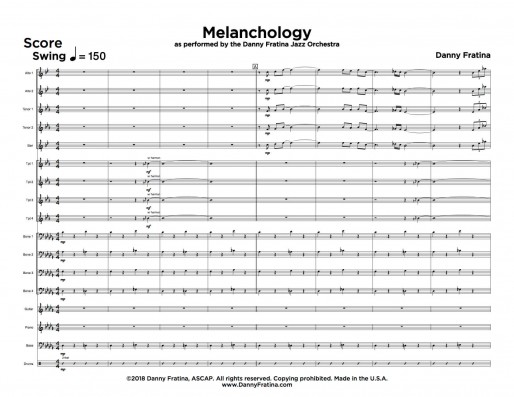 Melanchology is a moody medium tempo piece that is designed to be sophisticated but accessible. The opening march-like texture is supported by colorful nonfunctional harmony, leading all the way to a diminishing spacey ending. It's an easy level 3 with solo space for your best trumpet soloist and a little space for guitar and piano.
Melanchology is a moody medium tempo piece that is designed to be sophisticated but accessible. The opening march-like texture is supported by colorful nonfunctional harmony, leading all the way to a diminishing spacey ending. It's an easy level 3 with solo space for your best trumpet soloist and a little space for guitar and piano.Instrumentation Big Band Style Modern Jazz Level 3 TEMPO  = 150
= 150Trumpet
Range
-
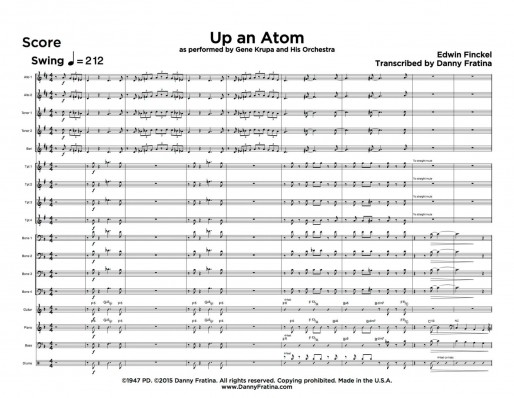 Another killin' Edwin Finckel original, Up an Atom pushes Gene Krupa's young orchestra to the limit, blurring the line between swing and bebop. Long stretches of solo space and plenty of great ensemble passages makes this a great flagwaver.
Another killin' Edwin Finckel original, Up an Atom pushes Gene Krupa's young orchestra to the limit, blurring the line between swing and bebop. Long stretches of solo space and plenty of great ensemble passages makes this a great flagwaver.Instrumentation Big Band Style Bebop, Swing Era Level 4 TEMPO  = 212
= 212Trumpet
Range
-
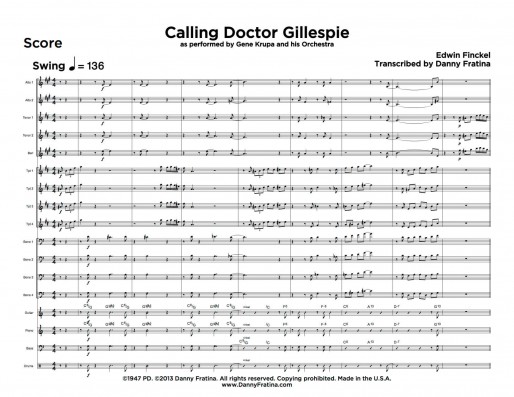 This Edwin Finckel rarity swings hard and doesn't shy away from its bebop influences. Straddling the line between the two eras of jazz, Calling Doctor Gillespie features some infectious melodies and singable shout choruses. High Gs for lead trumpet are all optional - without them the highest note is a Bb above the staff. A couple of solos in the middle round this out.
This Edwin Finckel rarity swings hard and doesn't shy away from its bebop influences. Straddling the line between the two eras of jazz, Calling Doctor Gillespie features some infectious melodies and singable shout choruses. High Gs for lead trumpet are all optional - without them the highest note is a Bb above the staff. A couple of solos in the middle round this out.Instrumentation Big Band Style Swing Era Level 3 TEMPO  = 136
= 136Trumpet
Range
-
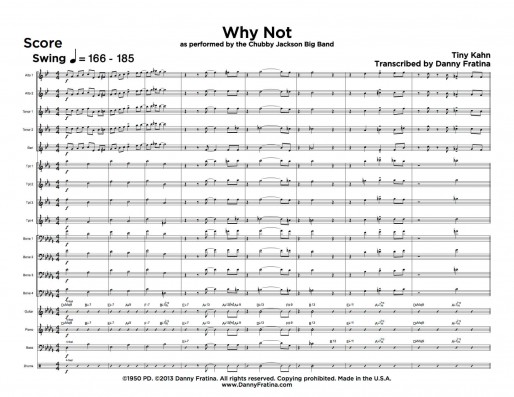 This Tiny Kahn chart is very consistent throughout with great lines and moving harmony. Filled with plenty of solo space around the band and some killin' trumpet lines, there are brief bursts of shout chorus pieces that build up past the final head out. Why Not is tough on the lead trumpet but worth the challenge.
This Tiny Kahn chart is very consistent throughout with great lines and moving harmony. Filled with plenty of solo space around the band and some killin' trumpet lines, there are brief bursts of shout chorus pieces that build up past the final head out. Why Not is tough on the lead trumpet but worth the challenge.Instrumentation Big Band Style Bebop Level 4 TEMPO  = 165-185
= 165-185Trumpet
Range
-
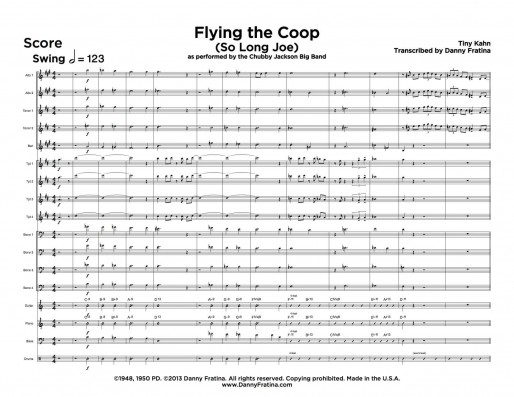 A huge fanfare-ish intro announces this amazing Tiny Kahn tune, and Flying the Coop is quickly off to the races. Unison sax and brass lines at a breakneck tempo fill the head, while the meat of the arrangement features big bebop statements, sax solos, and an old-fashioned trombone chase (an early teaming of JJ Johnson and Kai Winding).
A huge fanfare-ish intro announces this amazing Tiny Kahn tune, and Flying the Coop is quickly off to the races. Unison sax and brass lines at a breakneck tempo fill the head, while the meat of the arrangement features big bebop statements, sax solos, and an old-fashioned trombone chase (an early teaming of JJ Johnson and Kai Winding).Instrumentation Big Band Style Bebop Level 5 TEMPO  = 123
= 123Trumpet
Range
-
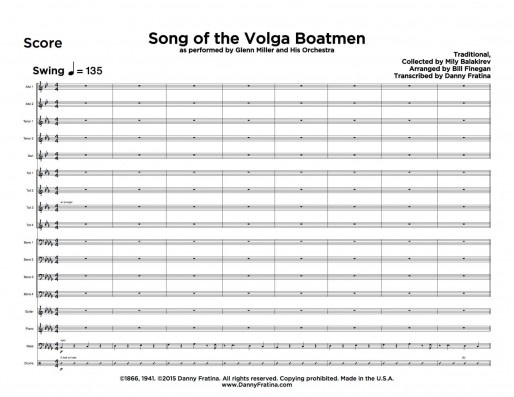 This swingin' Bill Finegan arrangement of a traditional Russian folk shanty has some great ensemble work, several peaks, and a rare jazz canon for the brass! Some simple plunger work helps ground it in the swing era, and a huge finale with harmony way ahead of it's time makes Song of the Volga Boatman a killer addition to any big band book.
This swingin' Bill Finegan arrangement of a traditional Russian folk shanty has some great ensemble work, several peaks, and a rare jazz canon for the brass! Some simple plunger work helps ground it in the swing era, and a huge finale with harmony way ahead of it's time makes Song of the Volga Boatman a killer addition to any big band book.Instrumentation Big Band Style Swing Era Level 3 TEMPO  = 135
= 135Trumpet
Range
-
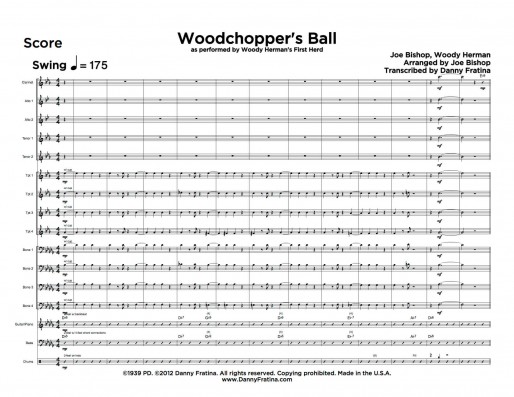 Woodchopper's Ball was Woody Herman's first big hit and would continue to be rewritten and rearranged for decades as a major anthem for him and his various Herds. Plenty of solo space and easy riffing can be found here over a medium tempo Db blues. This is a great, authentic introduction to the swing era and the blues form makes it playable for a band of any level!
Woodchopper's Ball was Woody Herman's first big hit and would continue to be rewritten and rearranged for decades as a major anthem for him and his various Herds. Plenty of solo space and easy riffing can be found here over a medium tempo Db blues. This is a great, authentic introduction to the swing era and the blues form makes it playable for a band of any level!Instrumentation Big Band Style Swing Era Level 1 TEMPO  = 175
= 175Trumpet
Range
-
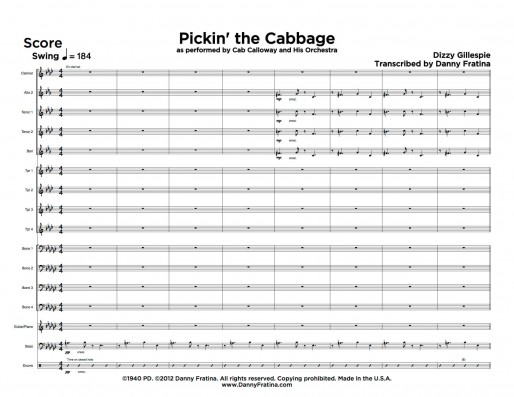 Written for Cab Calloway's band, Pickin' the Cabbage is Dizzy Gillespie's first ever big band composition. The slick tune features a great melody for a trio and many hints of modern bebop and afro-cuban music that would later be Gillespie's trademark.
Written for Cab Calloway's band, Pickin' the Cabbage is Dizzy Gillespie's first ever big band composition. The slick tune features a great melody for a trio and many hints of modern bebop and afro-cuban music that would later be Gillespie's trademark.Instrumentation Big Band Style Swing Era Level 3 TEMPO  = 184
= 184Trumpet
Range
-
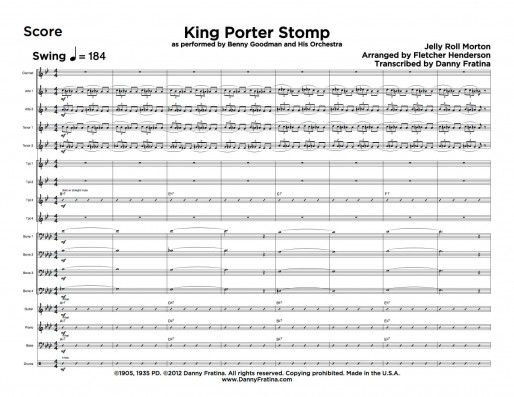 When Benny Goodman hired Fletcher Henderson, he turned the band's sound upside down, ushering in a new era of popular music. King Porter Stomp is demonstrative of the Henderson arranging style and is truly a Swing Era anthem. Solo space for several instruments, lots of tight ensemble work, and a roaring finish at the perfect dancing tempo makes this a quintessential piece in any big band's library!
When Benny Goodman hired Fletcher Henderson, he turned the band's sound upside down, ushering in a new era of popular music. King Porter Stomp is demonstrative of the Henderson arranging style and is truly a Swing Era anthem. Solo space for several instruments, lots of tight ensemble work, and a roaring finish at the perfect dancing tempo makes this a quintessential piece in any big band's library!Instrumentation Big Band Style Swing Era Level 4 TEMPO  = 184
= 184Trumpet
Range
-
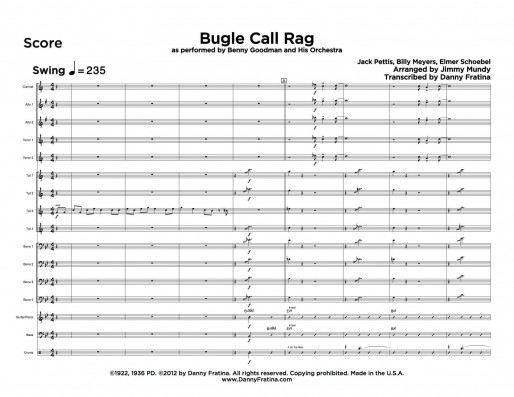 Bugle Call Rag is an all out flag waver that was a major hit for Benny Goodman. With simple chords and riffs and lots of solo space, this burning boogie-woogie/swing hybrid swings hard and is a quintessential swing era anthem.
Bugle Call Rag is an all out flag waver that was a major hit for Benny Goodman. With simple chords and riffs and lots of solo space, this burning boogie-woogie/swing hybrid swings hard and is a quintessential swing era anthem.Instrumentation Big Band Style Swing Era Level 3 TEMPO  = 235
= 235Trumpet
Range
-
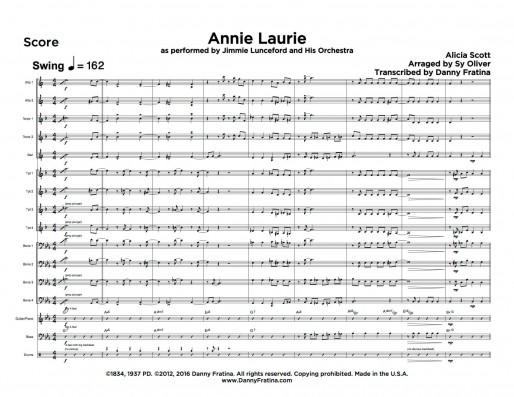 This is a killer arrangement of an old Scottish song that is full of meat and potato ensemble work. Beware the aggressive brass solos though: Solo trumpet plays up to a high F at the end, and they'll need to pull off the Paul Webster fireworks before then (the exact solo is written out but optional). You'll also need a lead trombonist to blast his way up to a HIGH F.
This is a killer arrangement of an old Scottish song that is full of meat and potato ensemble work. Beware the aggressive brass solos though: Solo trumpet plays up to a high F at the end, and they'll need to pull off the Paul Webster fireworks before then (the exact solo is written out but optional). You'll also need a lead trombonist to blast his way up to a HIGH F.Instrumentation Big Band Style Swing Era Level 4 TEMPO  = 160
= 160Trumpet
Range
-
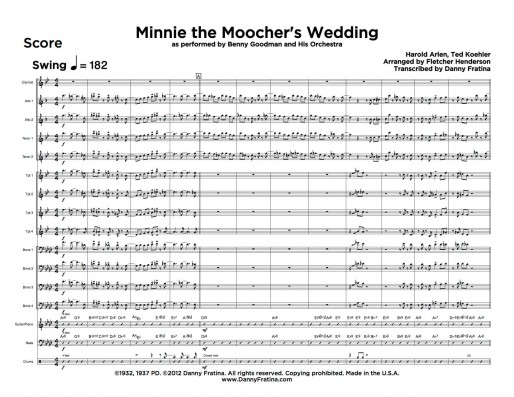 This wild piece starts out with Fletcher Henderson quoting of Mendelssohn's "Wedding March," but after two bars it's off to the races with tons of intricate riffs, solos, and a rowdy shout chorus at the end. Watch out for the lightening quick mute changing, which was standard practice in the 1930s. This piece makes a great wedding reception opener and many working bands using it now will open up the first solo section as a vamp to introduce a wedding party.
This wild piece starts out with Fletcher Henderson quoting of Mendelssohn's "Wedding March," but after two bars it's off to the races with tons of intricate riffs, solos, and a rowdy shout chorus at the end. Watch out for the lightening quick mute changing, which was standard practice in the 1930s. This piece makes a great wedding reception opener and many working bands using it now will open up the first solo section as a vamp to introduce a wedding party.Instrumentation Big Band Style Swing Era Level 4 TEMPO  = 185
= 185Trumpet
Range
-
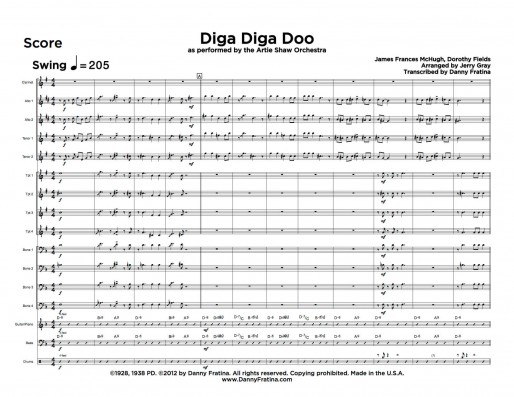 Diga Diga Doo was a heavily covered tune in the 1920s and '30s, but Artie Shaw's version was one of the tightest. A hard swinging and nimble riff vehicle that has some room for solos as well, Diga is a great upbeat piece that isn't too tricky and has lots of fun moments! Saxes configured as CAATT.
Diga Diga Doo was a heavily covered tune in the 1920s and '30s, but Artie Shaw's version was one of the tightest. A hard swinging and nimble riff vehicle that has some room for solos as well, Diga is a great upbeat piece that isn't too tricky and has lots of fun moments! Saxes configured as CAATT.Instrumentation Big Band Style Swing Era Level 3 TEMPO  = 205
= 205Trumpet
Range
-
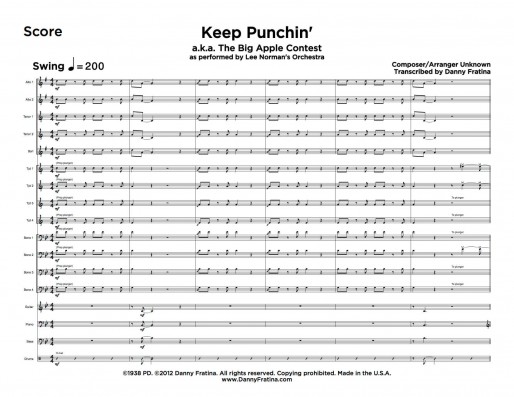 Also known as "The Big Apple Contest," this is a swing dancer staple and a must-have for any band that will ever play for swing dancers! After the famous simple intro a brass trio work plays off of a sax riff, and from there on it's simple burnin' riffs all the way home, with lots of great brass plunger work.
Also known as "The Big Apple Contest," this is a swing dancer staple and a must-have for any band that will ever play for swing dancers! After the famous simple intro a brass trio work plays off of a sax riff, and from there on it's simple burnin' riffs all the way home, with lots of great brass plunger work.Instrumentation Big Band Style Swing Era Level 2 TEMPO  = 200
= 200Trumpet
Range
-
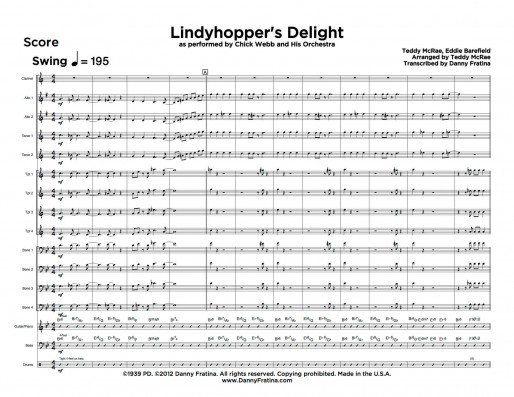 As standard dance repertoire, Lindyhopper's Delight is a catchy riff tune with a startlingly modern middle chorus that features some relatively harsh sax harmonies flanked by thickly-voiced plunger-supported brass hits. The final chorus is a raucous one, even though the brass are in full octave unison on a concert Bb! This is a great tune for any library though, and a good, albeit sometimes tricky, introduction to plungers for younger brass players.
As standard dance repertoire, Lindyhopper's Delight is a catchy riff tune with a startlingly modern middle chorus that features some relatively harsh sax harmonies flanked by thickly-voiced plunger-supported brass hits. The final chorus is a raucous one, even though the brass are in full octave unison on a concert Bb! This is a great tune for any library though, and a good, albeit sometimes tricky, introduction to plungers for younger brass players.Instrumentation Big Band Style Swing Era Level 2 TEMPO  = 195
= 195Trumpet
Range
Instrumentation: Big Band
STYLE
DIFFICULTY
VOCALS
PERFORMER
SOLOS
